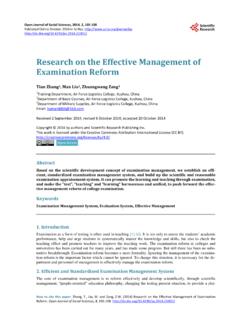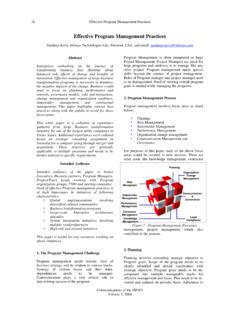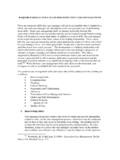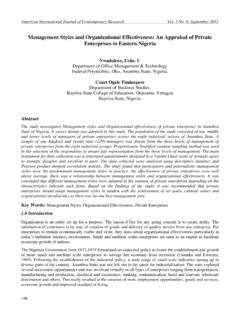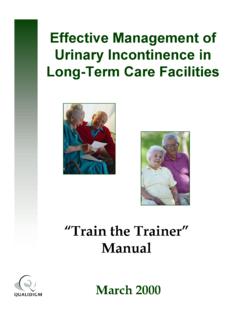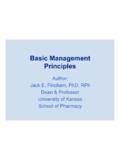Transcription of Issue 1, Summer 2002 Principles for Effective Management
1 Principles for Effective Management Are your employees valuableresources? Or are theyproblems to deal with? Do you feel as if there must bemore to managing than youthought? Does your staff operate as aseamlessly functioning team? Is your organization a placewhere people thrive?Your answers to these ques-tions say a lot about you, yourorganization and your view ofmanagement. As a manager,whether you are the executivedirector, a program manager ora supervisor, you set the tonefor your organization and shapehow people think and may be the mostwritten about and most taughtaspect of organizations. Yet,for many of us, it remains a bitof mystery. The purpose of thisarticle is to illuminate the natureof being a manager and toexplore a simple model of EffectiveManagementWe define Management as theart of producing results throughothers. 1 This is a simplestatement with profound impli- The real job of a manager is toinspire employees to be theirbest and establish a workingenvironment that allows for themto be their isan attitude a way of life.
2 Bob Nelson andPeterEconomy, Managing for Dum-miescations both for managers andthose being managed. In ourview, the most Effective manag-ers focus on the people beingmanaged and ensure that theyare set up to be is people-oriented,NOT process-oriented. Micro-managing occurs when manag-ers focus on the process, orhow the job is getting done,rather than on managers focus onpeople and their ensure that there is anenvironment in which both theindividual and the environment, we meaneverything that can (and does)affect performance and effec-tiveness. Our environmentincludes organizational visionand mission, short term andlong term objectives, practicesfor being Effective , tools andmethods for producing results,available resources, and train-ing and development. A man-ager addresses all thesefactors to empower individualsand teams to produce agreedupon Effective manager, then,focuses on the human factorIssue 1, Summer 2002and manages for results.
3 Thisapproach allows for severalpowerful outcomes, including: The bigger picture -- fulfillingon objectives, vision andmission -- guides your thinkingand your staff s thinking People are encouraged to becreative and to contribute People are accountable andhold themselves and others toaccount People have an opportunity togrow and are at least two addi-tional benefits to managing forresults: It takes less time and is farmore satisfying than managingthe process, and You don t have to know all theanswers!A Model for ManagingThe following principle-basedmodel for managing is consis-tent with managing for resultsand empowering people to beaccountable. There are fourprinciples in this model:1. Identify what is important2. Make what is importantmanageable and do-able3. Make choices that are consis-tent with what is important4. Invent and adopt practices thatsupport four Principles keep yourfocus and your staff s focus onthe results you want and path-ways to achieving you know what isimportant, and in what timeframe, you can set prioritiesand allocate resources intelli-gently.
4 To define what isimportant, consider the follow-ing: What do you want to accom-plish? What results do you want toproduce? What difference will thoseresults make? How will you know when youhave succeeded?Addressing this principle firstgenerates alignment betweenyou and your staff on the re-sults you are counting on themto results are identified, thenext area to address is makingwhat is important manage-able and do-able. Here, youensure that people have themeans to succeed. Thisincludes resources, knowledge,training, time, or whatever elseis critical to success. Holdingpeople to account and manag-ing for the result means firstmaking sure your staff is in factset up to produce the you can use toaddress this area include: What different ways are thereto make this happen? How will you make that hap-pen?Ultimately, your success as amanager-- inspiring people tobe their best -- depends on howyou view your staff (or people ingeneral).
5 Do you bring acommitment to empower and tosupport? Or, do you seepeople as problems that takeup too much time? In otherwords, how do you respond tothat age-old question, Arepeople fundamentally good orfundamentally bad? It s diffi-cult to inspire success if youdon t believe your staff is ca-pable, or if you think they can tbe trusted, or if they are objectsto be manipulated into doingtheir jobs. The basic questionto ask yourself is: Am I commit-ted to my staff succeeding asprofessionals and growing asindividuals? Allow this commit-ment to guide your a Manager What resources are needed toproduce this result? What are the major mile-stones? What is the time line (and is itpracticable)?Keeping you and your stafffocused on the results includesconsciously making choicesthat are consistent withachieving the results. Thisprinciple emphasizes thatproducing results meansconscious choice and decision-making -- sometimes moment-by-moment!
6 The principle ofchoice reminds us that wealways have the ability tochoose. Related questionsinclude: Are you making choicesconsistent with your plan andyour objectives? What other choices might youmake? What would it take for you todo that?Underlying this model is theprinciple of inventing andworking from practices thatsupport effectiveness. Prac-tices are the keys to the king-dom -- they empower andsupport you and your staff infulfilling on the goals and objec-tives you said are are two critical points tokeep in mind. First, you havethe power to invent are highly that you can inventthem gives the freedom todesign practices that fit you!Second, practices, whenapplied consistently, make iteasy to maintain your focusand to be that support theinvention and use of practicesinclude: How will you make sure thisturns out? (Look for practices,reminders or ways to supportproducing the desired result.) What new practices couldmake a difference in youreffectiveness?
7 Our model of Management issimple, straightforward andeasy to apply in any model s four Principles areuseful across the board --whether dealing with an upsetemployee or developing astrategic the emphasis on peopleleads to deeper relationshipsand a deeper sense of being onthe same team. Both are solidfoundations for fulfilling on thevision and mission of yourorganization. Inspiring peopleto be their best and providingan environment where that ispossible is also the source ofprofound satisfaction. More-over, it leads to peace andfreedom for you. You don t haveto have all the answers and youaren t alone!Tips for EffectivenessComponents of an Organiza-tional Environment of Excel-lenceWhat IS an Effective environ-ment for organizational excel-lence? It will include:Vision -- Everyone finds per-sonal and shared inspiration inthe future of the -- Everyone participat-ing is clear about the vision andmission of the organization,individual roles and responsi-bilities, appropriate lines ofcommunication, and what -- Tthere is a gen-eral alignment about the job tobe done and an agreed-uponapproach to working -- Everyone is FOReveryone else s success, andeveryone is clear that no-onewins unless and until -- There is a generalsense of focus and -- Shared workpractices spur productivity andsense of -- There is physical andmental room to get the -- Everyone doescomplete work, with clarityabout desired outcomes andopen communication aboutwork status, needs and & AnswersWhen Everything Is in Disar-ray, Where Do We Start?
8 Every project, plan and actionbegins with a vision. Beforeyou begin anything, envision theoutcome you are after. Addresssuch questions as: Why is this outcome impor-tant? How will it forward yourorganization s mission? What inspires you about thisaccomplishment?When clarifying the results thatare important, be both specificand thorough. For example, youmay intend to produce a suc-cessful program AND haveyour staff thrive. Don t leaveout any intended the qualities andcharacteristics of the outcome,rather than the process bywhich you ll achieve it. Forexample, establish a founda-tion for financial viability bydesigning a funding plan forproducing $x sustainably, will give you a more powerfulplace to stand than raise$100,000 by March 31, even ifthe latter has its place. It is impossible to make anintelligent choice among manypossible actions without a clearsense of your ultimate destin-ation. Once that destination isestablished, you will find manyappropriate pathways to This NewsletterWelcome to our first Issue ofNonprofit Notes, a newsletterdedicated to supporting anenvironment of excellence inthe nonprofit community.
9 Ourpurpose is to provide a forumfor examining issues related toindividual and decided to publish thisnewsletter because we see somany organizations dealingwith the same issues, con-cerns and commitments. In ourwork, we see an astonishingsimilarity in issues related toeffectiveness, productivity,staff development, teamwork, Management growth and all-around job commitment is to provideinformation, approaches andmethodologies that make adifference in your ability to beeffective and successful in fulfillingyour mission and Notes is availablethrough regular mail or on-line Send us your e-mail address if you prefer on-lineaccess. We welcome yourquestions and and Sunny Yateseffective environmentseffective environmentseffective environmentseffective environmentseffective environments3910 N. Blackhawk RoadSilver City, NM 88061 Tel: (505) 534-2121 Fax: (505) 388-1016E-mail: by: Effective environ-mentsEditor: Gary YatesCall or email us for your freesubscription.
10 Copyright 2002 byeffective environments
